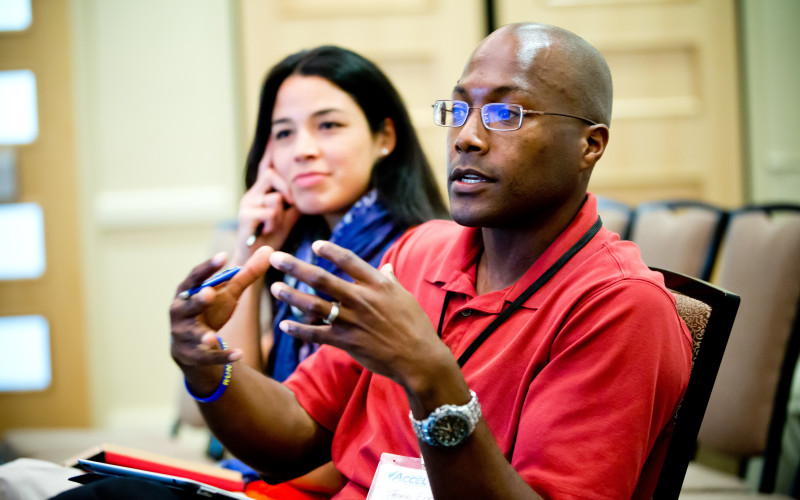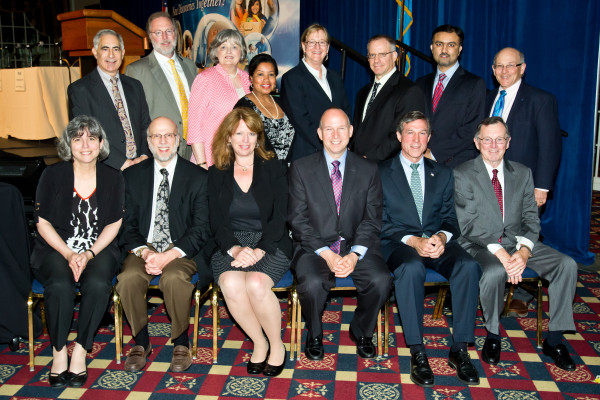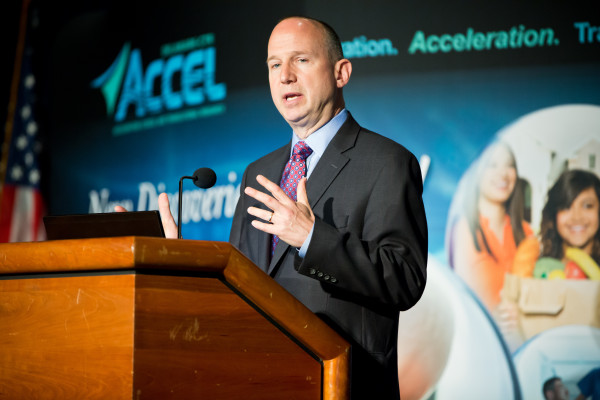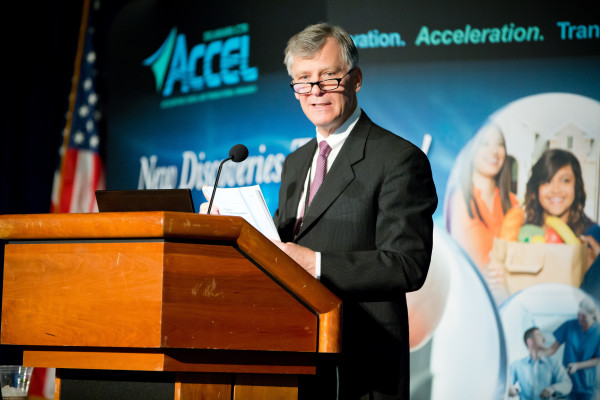Conference explores community engagement in health research

Christiana Care Health System is leading a new kind of research endeavor — developing projects in partnership with members of underserved communities to improve health.
In a key component of the ACCEL grant for clinical and translational research initiatives, Christiana Care is working to conduct research that is meaningful to Delawareans, and ultimately will improve health in the First State. This was the focus of the Delaware CTR-ACCEL conference on community engagement on May 12 at the Chase Center on the Riverfront in Wilmington. Attended by more than 200 researchers, health care professionals and community leaders, the conference focused on how to develop research initiatives that will translate from hypothesis to effective treatment and better health care.
“ACCEL” is a shortened name for Accelerating Clinical and Translational Research, a $28 million multisite grant from the National Institutes of Health.

“ACCEL will have a great impact on clinical and translational research in Delaware and our partner state, South Carolina,” said Michael Rosenthal, M.D., chair of Family & Community Medicine at Christiana Care and ACCEL’s leader for community engagement and outreach. “Results will demonstrate significant improvement in health outcomes for individuals, families and communities.”
At the conference, experienced health care providers offered their perspectives on the opportunities and challenges of community engagement. All attendees could then share their views on community engagement in workshops with topics vital to the health of Delawareans: obesity, cardiovascular health, maternal and child health, cancer and using social media for community engagement.
Creating an infrastructure for clinical and translational research is the key reason the National Institutes of Health in 2013 awarded a five-year, $20 million grant to four research partners: Christiana Care Health System, the University of Delaware, Nemours/A.I. duPont Hospital for Children and the Medical University of South Carolina. In addition, the state of Delaware is providing $5 million and the research partners are jointly contributing $3.3 million in matching funds.
“The partners have put an emphasis on innovation, acceleration of research and translation of research to patient treatments that will win major new funding, continuing the cycle of advancements — all of which will benefit our neighbors and communities,” said Omar Khan, M.D., MHS, FAAFP. Dr. Khan, Christiana Care’s associate vice chair of Family & Community Medicine and co-director of community engagement and outreach for ACCEL, chaired the conference.

New research is important, especially if it can help reduce health costs, which are on a trajectory that is unsustainable, said Delaware Governor Jack Markell, who, with Delaware’s U.S. Rep. John Carney, greeted conference participants. Both said they are hopeful for what the NIH grant will achieve.
Smoking prevention and cessation is an example of how communities can use evidence from research to crowdsource change, said keynote speaker Patrick J. Quinlan, M.D., CEO of the Ochsner Clinic Foundation & International Services and executive director of Ochsner Center for Community Wellness & Healthy Policy. Dr. Quinlan called smoking a unique hazard and an “epidemic by design,” in that cigarettes are the only legal substance that will kill 480,000 Americans this year, if used exactly as directed. As the danger of smoking has been revealed in thousands of studies, community engagement has led to public policies, such as those prohibiting the sale of cigarettes to minors, Quinlan said.
This struck a chord with Ed Sobel, D.O., a member of ACCEL’s Community Advisory Committee and long-time New Castle County family physician. “In counseling patients to stop smoking,” Sobel said, “I never knew when I was effective and when I was going through the motions. We can use research on how best to advise people in our community.”
Sobel, who attended the workshop on cardiovascular health, said he was impressed by an idea for spreading health care messages offered by LaVaida Owens-White, RN, MS, a Community Advisory Committee member and a nurse consultant after retiring from Christiana Care. Owens-White had visited hairdressers in the African-American community to tell them about the availability of free mammograms. After Owens-White visited the hairdressers, health providers saw an increase in women requesting mammograms, demonstrating the powerful impact of this innovative approach.
William S. Weintraub, M.D., John H. Ammon Chair of Cardiology and director of the Center for Outcomes Research at Christiana Care’s Value Institute, was a facilitator of the cardiovascular health workshop. Dr. Weintraub, who is also the Christiana Care lead for the ACCEL project, said he was impressed by another suggestion, which is to have pastors and rabbis deliver health care messages from the pulpit.
“This level of community leadership can have a tremendous impact,” Dr. Weintraub said.
Overall, Dr. Rosenthal said he was pleased with the results of the day, as it led to new conversations and the start of new partnerships.
“Not everybody is going to be on the same page all of the time,” he said. “But partnerships are about learning from each other’s perspectives. We will accomplish our goals as we build networks and connections to keep advancing knowledge.”

Community Advisory Committee explores ways to translate research
Joining in the discussion at the May 12 conference were members of ACCEL’s new Community Advisory Committee, who explored how community engagement can become a core component in building infrastructure for translating research into clinical practice.
“The role of the Community Advisory Committee is incredibly important in offering perspectives for productive approaches to solving health problems,” Dr. Rosenthal said.
The Community Advisory Committee has 17 members. Devona Williams, Ph.D., a Delaware-based management consultant with an expertise in diversity training and community engagement, has worked with Dr. Rosenthal and ACCEL colleagues to develop the committee. It includes a diverse group of representatives from faith-based and community health organizations, educators, health providers, and leaders from government, non-profits and corporations.
In recruiting people for the committee, Williams explained that broad community engagement around medical research is relatively new to Delaware.
“We want people’s practical ideas on how to improve health outcomes and to feel vested in this work and know that their input is valued,” said Williams. “This is the creation of a new research infrastructure.”